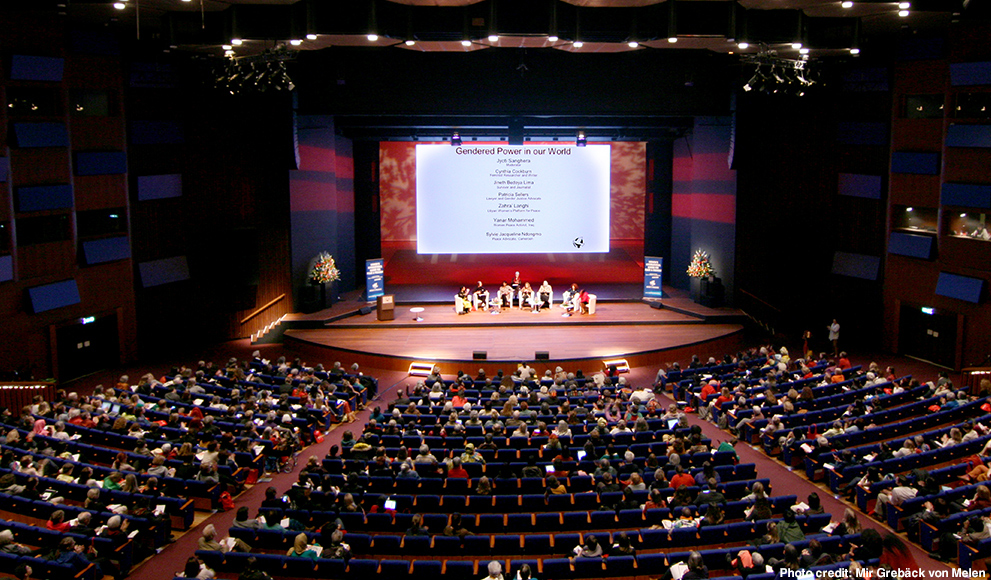Life-Changing Lessons from the 2015 Women’s Power to Stop War Conference

Catia Confortini, assistant professor of Peace and Justice Studies, understands the value of learning about activism from other activists. That’s one reason she began making plans last winter for her Peace and Justice Studies (PEAC 304) students to attend and present at the 2015 Women’s Power to Stop War conference, hosted by the Women’s International League for Peace and Freedom (WILPF) in The Hague, Netherlands.
“One of WILPF’s core beliefs is that wars cannot be stopped without the participation of women,” said Confortini, who is vice president of WILPF International. “This mirrors Wellesley’s firm commitment to prepare women to make a difference in the world.”
The three-day event, held in late April, drew more than 1,000 participants from 80 countries and focused on peace building from a holistic perspective. Speakers, including four Nobel laureates, emphasized the necessity of working with governments and local communities to eliminate the causes of conflict, such as social and economic injustice, militarism, and patriarchy.
For Confortini’s six students— Bridget Dunn ’15, Kanda Faye ’15, senior Davis Scholar Estela Hernandez, Erika Liu ’15, Amelia Redmond ’16, and Sydney Stewart ’18—the conference reinforced what they’d learned in class and provided a once-in-a-lifetime opportunity to run a workshop for participants titled “Students Generating Peace Activism: Opportunities and Barriers in Academia and Beyond.” Each student gave three seven-minute presentations as part of the workshop.
“I am very excited to take part in this conference,” wrote Kanda Faye on her Facebook page. “In participating in this panel, I hope to add to ongoing dialogues on how feminist peace activism in practice and in academia could more strongly resonate with black women and other women of color to foster and strengthen a youthful and diverse feminist peace activist community that is evermore dedicated to social justice at home and abroad.”
Confortini was delighted by the group’s performance and the audience’s warm reception. “Several colleagues told me how impressed they were by the students’ articulate and passionate presentations,” she said. “The Boston branch of WILPF invited the group to speak at their May gathering.”
Those successes represent the latest chapter in a rich history of Wellesley alums and faculty creating positive change, Confortini said. “WILPF was founded in 1915 when women from various countries met in The Hague with the ambitious goal to stop World War I. Among those women were Emily Greene Balch, who was teaching economics and sociology at Wellesley at the time, and her dear friend Jane Addams, founder of Hull House in Chicago.”
Addams and Balch became the first two American women to win the Nobel Peace Prize, in 1931 and 1946 respectively. WILPF was instrumental in the formulation of the United Nations Security Council’s landmark resolution on women, peace, and security in 2000, and in the development of the U.N.’s agenda on women in conflict and peace.
“The Wellesley students of today will undoubtedly be engaged in carrying out the 21st century peace agenda as future activists, policy makers, scholars, and journalists,” Confortini said.
Bridget Dunn, now a fellow with the U.S. Public Interest Research Group in Boston, agrees, and is grateful for everything she learned at The Hague. Some of the most profound lessons, she said, came during conversations with Tanya Henderson, the founder of Mina’s List, and Nobel laureate Leymah Gbowee, who helped bring an end to the Second Civil War in Liberia in 2003. Both women emphasized the importance of building a strong infrastructure and maintaining a healthy, long-range view of the challenges they face.
“It’s so easy to feel like the work you’re doing is small, because it’s happening on a community level, or at Wellesley, or it just seems like little steps,” said Dunn. “But when you gather a thousand women who are all doing activism, and work together to share and collaborate and build plans for the future, the work suddenly seems much bigger than us, and the goals much more possible.”
-Funding for The Hague trip was made possible by the offices of the Provost and the President and the WILPF Boston Branch. Professor Confortini and her students are also deeply grateful to the many individuals who contributed funds via social media.
